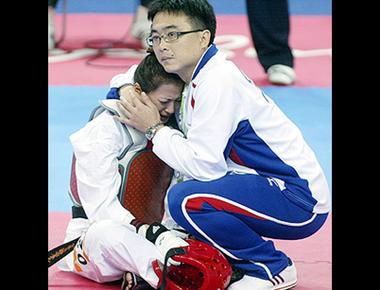

第一次看到新聞標題寫 ”楊淑君失格” 時還真嚇了一跳
以為是她做了什麼有辱名聲的事
因為中文裡的 ”失格” 兩個字原本的意思並不是 ”喪失資格”
這是台灣媒體最近自創的詞
中文裡的 ”失格” 原本是指做了踰越分寸, 有失尊嚴的事
或者是不符合規定
https://www.chinabaike.com/dir/cd/S/405239.html 和這次台灣各大媒體都用來指 ”喪失比賽資格” 是不一樣的
(我猜這大概是一些國文造詣很差的七年級記者想出來的吧......)
”喪失資格” 在英文裡的說法是 be disqualified [dɪsˋkwɑlə͵faɪd]
要用被動語態
比如:
“Taiwanese taekwondo athlete Yang Shu-chun was disqualified from the
Asian Games yesterday…...”
我們還可以順便學一下 ”跆拳道” taekwondo [taɪˋkwɔndo]
”運動員” athlete [ˋæθlit]
”亞運” the Asian Games
另外, 原形的 disqualify 這個字本身是個動詞
意思是 ”取消某人的資格” 或 ”使某人不合格”
比如:
以為是她做了什麼有辱名聲的事
因為中文裡的 ”失格” 兩個字原本的意思並不是 ”喪失資格”
這是台灣媒體最近自創的詞
中文裡的 ”失格” 原本是指做了踰越分寸, 有失尊嚴的事
或者是不符合規定
https://www.chinabaike.com/dir/cd/S/405239.html 和這次台灣各大媒體都用來指 ”喪失比賽資格” 是不一樣的
(我猜這大概是一些國文造詣很差的七年級記者想出來的吧......)
”喪失資格” 在英文裡的說法是 be disqualified [dɪsˋkwɑlə͵faɪd]
要用被動語態
比如:
The singer was disqualified from the contest.或:
(這名歌手喪失了比賽資格)
You can be disqualified if you don’t pass the drug test.或是像英文報紙 Taipei Times 說的:
(如果你沒通過藥檢,可能會喪失資格)
“Taiwanese taekwondo athlete Yang Shu-chun was disqualified from the
Asian Games yesterday…...”
我們還可以順便學一下 ”跆拳道” taekwondo [taɪˋkwɔndo]
”運動員” athlete [ˋæθlit]
”亞運” the Asian Games
另外, 原形的 disqualify 這個字本身是個動詞
意思是 ”取消某人的資格” 或 ”使某人不合格”
比如:
The association disqualified the athlete over a political dispute.很諷刺的一句話, 卻是台灣人早已習慣的國際現實...... 唉......
(該協會由於政治爭議而取消了這名運動員的資格)
重連英語 · Rewired English
I’m an American English teacher in Taiwan who works almost exclusively with adults.
I don’t teach tests, textbooks, or children.
My classes focus on speaking, pronunciation, and natural conversation, with real correction — not just chatting.
Classes are 100% in English (this actually helps speaking more than people expect).
I’m opening a few new conversation slots right now.
If you’re an adult who wants to actually speak better, feel free to comment or message me.








